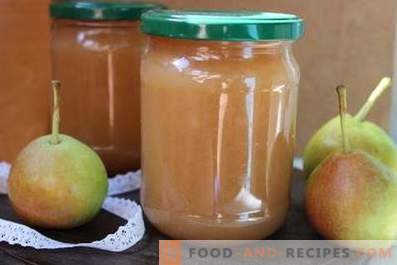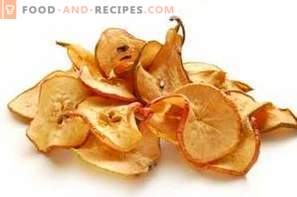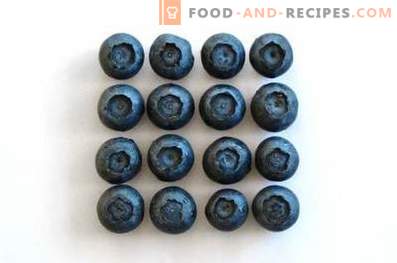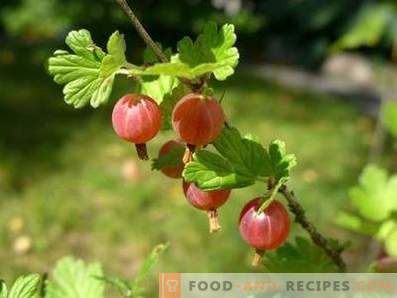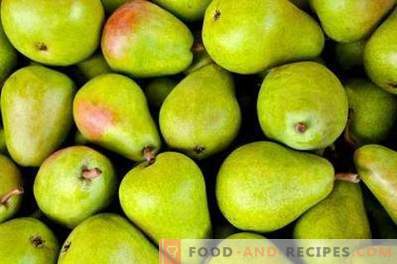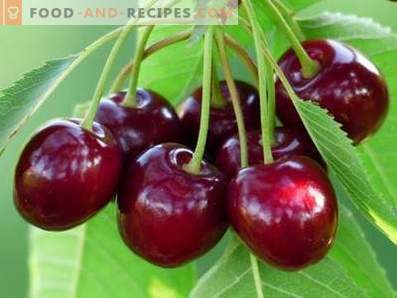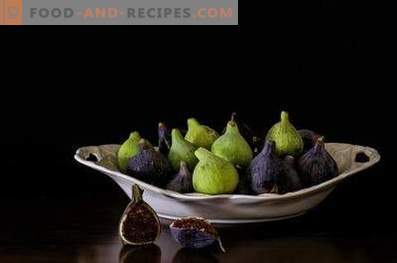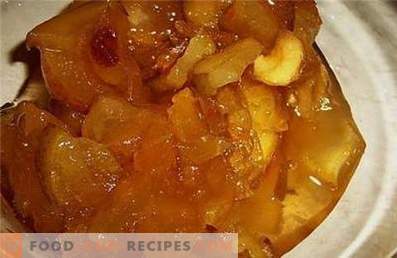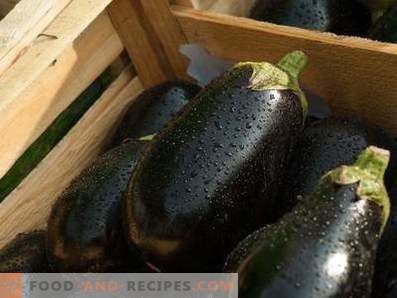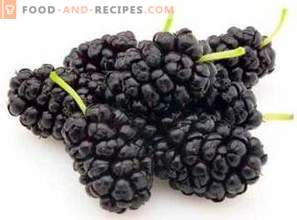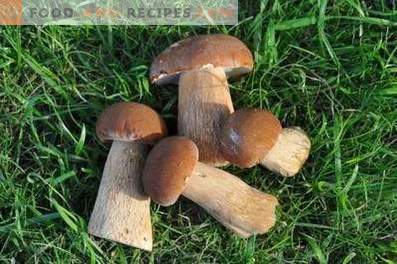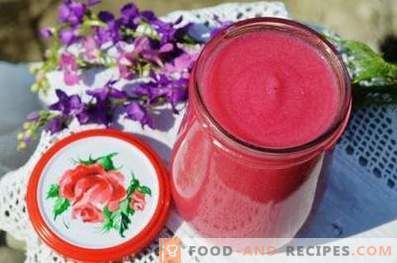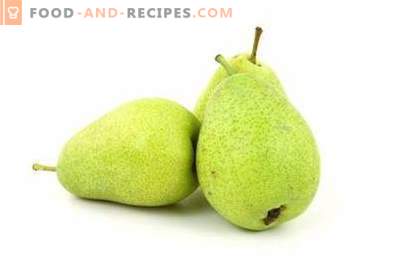
A pear is a deciduous plant belonging to the Rosaceae family. The first mentions of these trees are found in the ancient Chinese odes, dated to the II millennium BC, therefore the lands of Central China are considered the birthplace of the plant. Today, pears grow in a vast area from Western Asia to Eastern Europe. However, the largest producer of the fruits of this plant and their supplier to the international market is still China.
A pear is a tree up to 23 meters high, with abundantly branching dense crown and a powerful trunk covered with gray wrinkled bark. Leathery green leaves of the plant, located on the elongated petioles, are oval or rounded. The tree blooms in late April, large pink or white flowers, collected in small inflorescences.
For the first time pear fruit on the 3-8th year after planting. The fruit of the plant may have a spherical or elongated shape with a slight expansion in the lower part. The size, taste and color of pears can vary considerably depending on the variety. Fully ripen to the beginning of autumn.
Pears are eaten fresh, baked and dried. Juices, compotes, candied fruits, salads, snacks, preserves, jams and fillings for confectionery are prepared from the fruits of this plant. In addition, they are actively used in alternative medicine to combat a whole group of pathologies.
Nutritional value of pears and vitamins in the composition of its fruits
Nutritional value 100 g pears:
- 0, 349 g of proteins;
- 0, 271 g of fat;
- 10, 214 g of carbohydrates;
- 0, 486 g of dextrins, starch;
- 0, 495 g of organic acids;
- 9, 794 g of sugars;
- 5, 114 g of fructose;
- 1,784 g of glucose;
- 2, 716 g of fiber;
- 84, 792 g of water;
- 0, 698 g of ash.
Vitamins per 100 g of pears:
- A, retinol equivalent - 1, 878 mcg;
- B9, folates - 1, 914 μg;
- K, phylloquinone - 4, 483 mcg;
- B1, thiamine - 0, 017 mg;
- C, ascorbic acid - 4, 858 mg;
- B2, riboflavin - 0, 027 mg;
- E, tocopherol equivalent - 0, 378 mg;
- PP, niacin equivalent - 0, 183 mg;
- B5, pantothenic acid - 0, 047 mg;
- H, biotin - 0, 091 mkg;
- B6, pyridoxine - 0, 026 mg.
Pear calories
Caloric value of 100 g of fresh pears is 46, 481 kcal. Thus, in one fruit of medium size (140 g), 65, 073 kcal is contained. Dishes made from pears have the following energy value (per 100 g):
- fruit puree - 51, 738 kcal;
- juice - 47, 892 kcal;
- dried fruits - 248, 411 kcal;
- jam, jam - 272, 388 kcal;
- compote - 69, 812 kcal;
- baked fruits - 46, 213 kcal.
Candied fruits are considered the most high-calorie product prepared from pears. Their energy value is 344, 627 kcal per 100 g.
Useful items in pears
Trace elements per 100 g of pears:
- boron - 129, 711 μg;
- nickel - 16, 127 μg;
- selenium - 0, 092 mkg;
- manganese - 0, 064 mg;
- zinc - 0, 087 mg;
- iodine - 0, 977 mcg;
- vanadium - 4, 881 mkg;
- copper - 119, 534 mkg;
- rubidium - 43, 572 mkg;
- fluorine - 9,613 μg;
- cobalt - 9, 992 mkg;
- molybdenum - 4, 812 mkg;
- iron - 2, 213 mg.
Macroelements per 100 g of pears:
- magnesium - 11, 711 mg;
- silicon - 5, 849 mg;
- phosphorus - 15, 723 mg;
- sodium - 13, 923 mg;
- potassium - 154, 709 mg;
- chlorine - 0, 914 mg;
- sulfur - 5, 212 mg;
- calcium - 18, 424 mg.
Features of selection and storage of pears
When choosing pears should focus on smell and tactile sensations. Well-ripened and high-quality fruits have a strong sweet-fruity aroma, softish structure. At the same time on their skin should not be signs of decay, mold and damage.
The storage time of pears depends on their variety. These fruits should be stored in dark and cool places: on balconies, in cold stores, in cellars or cellars. It is not recommended to freeze pears.
Useful properties of fresh pears for the body
- Pears are the richest source of vitamins and other nutrients that create conditions for the normal functioning of the body. People who regularly include these fruits in their diets do not face the problem of beriberi, they recover faster after suffering diseases, increased physical and mental stress.
- In alternative medicine, pears have been used for centuries for the prevention and treatment of prostatitis. Folk healers recommend that men aged 50 years or older eat at least 1 fruit each day from this plant.
- Pears contain pectins, organic acids, tannins with antimicrobial properties. That is why the fruits themselves and the broths prepared from them are used in alternative medicine to combat infectious diseases.
- The pear pulp contains beneficial substances that can increase the body's immune strength.
- Several pears eaten throughout the day completely fill the body's need for B vitamins. Therefore, people who regularly include these fruits in their menu are less likely to experience depression, sleep disorders, and neuroses, and they more easily tolerate psycho-emotional upheavals and stresses.
- Useful compounds contained in pears accelerate metabolism, contributing to weight loss. At the same time, the fruits themselves have a reduced energy value, which means that people who are trying to get rid of excess weight can safely supplement their diet with them.
- Pears contain nutrients that can block the spread of inflammatory processes in the body.
- Pears are a natural source of iron and other elements, without which the formation of healthy blood cells is impossible. People suffering from diseases of the hematopoietic system are recommended to eat 2 fruits of this plant per day.
- Pear pulp contains nutrients that ensure the normal functioning of the heart muscle, regulate the heart rate, strengthen the vascular walls and give them extra elasticity, remove excess cholesterol from the body and prevent atherosclerotic plaques from forming. With regular consumption of these fruits, the risk of developing cardiac pathologies is noticeably reduced.
- With moderate consumption of pears, digestive processes are normalized, the production of gastrointestinal enzymes is activated. Useful compounds present in the pulp of these fruits, prevent the development of processes of decay in the intestine.
- Raw pears are an effective remedy for constipation.
- The fruits of this plant contain substances that have tonic properties. At consumption of pears the mood improves, daytime sleepiness disappears, working capacity increases.
- Antioxidants present in the pulp of pears have a positive effect on the condition of the skin, increase its elasticity and elasticity, give it a radiant, healthy appearance, prevent the formation of wrinkles. In addition, substances belonging to this group prevent the formation of cancer cells in the body and the development of cancer.
- Cosmetic masks from pears ground with mashed potatoes help to cope with acne, narrow enlarged pores on the face. Due to the presence of solid stone-like cells, pear gruel can be used as a natural scrub to remove dead skin particles.
Useful properties of dried pears
- A decoction made from dried pears contains a large amount of tannins, compounds with pronounced astringent properties. In order to get rid of diarrhea, it is enough to drink at least 2 glasses of this drink during the day.
- Compote of dry pears - an effective remedy for diseases of the urinary tract. The drink blocks the spread of the inflammatory process, destroys pathogens, increases diuresis, thereby contributing to accelerated recovery.
- In folk medicine, a decoction of dried pears is used to treat a strong cough (including for tuberculosis). The tool take 400 ml per day, dividing the entire dose into several doses.
Benefits of pear juice
- Pear juice with rosehip syrup is an effective folk remedy for bronchitis. For therapeutic purposes, the drink take 1, 5 cups a day, dividing the daily portion into several receptions.
- Freshly squeezed pear juice quickly relieves fever, eliminates intoxication symptoms of the body. To obtain a therapeutic effect, it is enough to drink 1/5 cup of this drink every hour.
- Folk healers believe that people suffering from urolithiasis should drink half a glass of fresh pear juice daily. The composition of this drink contains substances that can dissolve the calculi.
- Pear juice contains compounds that accelerate the excretion of toxins, slags and other toxic substances from the human body.
- According to nutritionists, this drink can improve the condition of people with diabetes. For medicinal purposes, it is consumed in 70 g before each meal. Under normal tolerance, the dose of the agent is gradually increased to 180 g.
Contraindications and harm to pears
- Raw pears are contraindicated for people suffering from stomach ulcers and other gastrointestinal diseases.
- Nutritionists do not recommend eating these fruits on an empty stomach: their flesh contains substances that irritate the intestinal epithelium. The optimal time for their consumption - after 40-50 minutes after a meal.
- Pears are a potential allergen. Therefore, people with allergies should carefully include these fruits in their diet.
- Nutritionists do not recommend drinking a freshly eaten pear with water: such actions can lead to the development of diarrhea.
- It is desirable for elderly people and children to eat only well-matured pears of cultivated varieties or fruits that have undergone heat treatment (boiled, baked, etc.).

